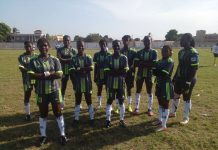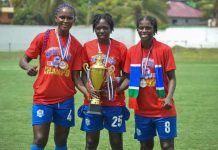By: Kebba AF Touray & Sariba Manneh
The Governor of the Central Bank of the Gambia, Mr. Buah Saidy has said remittance payments from the Gambian diaspora in 2023, stood at USD737.12 million, approximately forty-five billion, six hundred and ninety-four million Dalasi (D45,694,000,000.00).
Governor Saidy made this disclosure on Saturday, 13 January 2024, while reporting on the country’s remittance inflow figures for 2023, at the Seventh Edition of the Stake in National Forum conference (SNF7) organized by the Gambian Diaspora for Sustainable Development. The SNF, which was initiated in 2017 as an annual consultative dialogue,is integral to Gambian diaspora policy and practice as an emerging national institution, which continues to facilitate development engagement, interaction, consultation and collaboration, between the Gambian diaspora and Ministries, Departments and Agencies (MDAs), and a diverse range of Non-State Actors (NSAs).
According to Mr Saidy, the diaspora in particular is very instrumental in the transmission of remittances to the Gambia and as such, are considered very important stakeholders in improving the lives and livelihoods of the citizenry.
“For the year 2023, total remittance inflows to the Gambia stood at US$737.12 Million. This accounted for 32.11 percent of our nominal GDP and represents an increase of 3.46 percent over the same period in 2022,” the CBG Governor said.
He continued: “Remittances continue to play a pivotal role in the economic development of the country, and its economic impact cannot be overestimated. Over the years, official statistics on remittances have recorded substantial inflows, providing direct economic benefits to Gambians from all walks of life.”
Governor Saidy reported that it is important to outline that remittances are key sources of foreign exchange for the Gambia, and has considerable impacts on the nation’s balance of payments.
In this regard, the inflow of funds is a vital source of foreign exchange for business persons and importers, and helps in easing international flow of goods and services into the Gambia.
On the transmission of funds using informal channels, Mr Saidy said the Central Bank of the Gambia (CBG) projects remittances to grow in the coming years, due to the increasing adoption of formal channels by the Gambian diaspora, as well as the growing number of Gambian investors venturing into money transfer businesses.
“This will no doubt increase the official inflow of remittances, and hence, the introduction of the CBG concept of National Direct Investment (NDI). This offers nationals both at home and abroad, the chance to direct near private savings to finance strategic national development assets as investors,” the Governor Saidy said.
He added that this will hence earn the nation dividend payments from national assets, as well as give the citizens pride in contributing to building strategic national assets. He explained that national direct investment offers the platform for the citizens to leverage investment opportunities that could arise from the country’s development needs, and one such example he cited is the planned Sting Corner to Abuko and Brikama Bypass Toll Road.
“The Gambia Government is working hard on this and when all the analysis is done, you will be informed of the investment opportunities hopefully very shorty in 2024,” he informed the convergence.
Mr Saidy told the gathering that the CBG recently launched the ‘Capital Market’ following the enactment of the ‘Capital Market and Securities Act’ in 2023.
“This will help provide an avenue for the diaspora to invest through buying shares of listed companies and owning equity in the national Direct Investment Assets,” he said; adding that this will immediately address the challenges involved in directly operating and maintaining businesses.
He reported that the CBG is working on other initiatives, including the one that seeks to continue enhancing the digitization of remittance inflows and the introduction of other innovative financial instruments. These, he said, are with a view to reducing transaction costs and increasing access, and that it will make it easier to send money back home and help unleash the development potential of remittances.





















